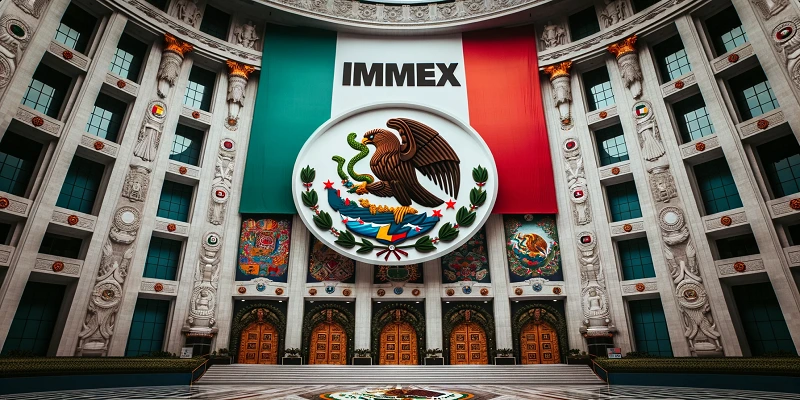
The Immex program seeks to modernize the globalization of Mexico's manufacturing infrastructure by introducing new and specialized technology to the region, so it has become a game-changer. Here, we will cover the details of the IMMEX Program Mexico with insights into its origin, working, eligibility, and benefits, and also answer some burning questions you might have.
What is the IMMEX Program in Mexico?
The Immex Program, short for "Industrial Manufacturing, Maquila, and Export Services Industry," is a strategic initiative by the Mexican government. It aims to encourage foreign investment and facilitate international trade by providing a range of incentives to businesses engaged in manufacturing, assembly, and export activities. This program has been a linchpin for companies looking to optimize their operations and tap into the thriving Mexican market.
IMMEX Background
The IMMEX program has its roots in the maquiladora industry, which emerged in the 1960s. Maquiladoras are manufacturing plants, often near the U.S.-Mexico border, that import materials and components duty-free for assembly or processing. The finished products are then exported.
The term "IMMEX" stands for "Industria Manufacturera, Maquiladora y de Servicios de Exportación," which translates to the Manufacturing, Maquiladora, and Export Services Industry. This program was introduced in 2006 by the Mexican government to promote foreign investment, stimulate economic growth, and boost the country's manufacturing sector.
Immex Program in Mexico: Revolutionizing International Trade
Mexico's Immex Program is a strategic vision by the Mexican government, aiming to revolutionize businesses in their approach to international trade. By incentivizing foreign investment and simplifying trade processes, the IMMEX Program is rewriting the rules of engagement and creating a dynamic platform for businesses to thrive.
At its core, the IMMEX Program is a catalyst for economic transformation. By offering a range of incentives, businesses find themselves in a position to significantly reduce operational costs. This reduction not only fosters a competitive edge but also fuels economic growth as companies reinvest their savings into innovation, expansion, and job creation.
Strategically positioned at the crossroads of global commerce, Mexico leverages the Immex Program to enhance its competitiveness in various industries from automotive to aerospace. The program acts as a gateway for businesses to access the Mexican market, fostering innovation and propelling them onto the global stage.
Actually, the Immex Programme is redefining the narrative of international trade and providing companies with a road map for long-term success in a constantly changing global economy.
IMMEX Program Operational Dynamics
The operational dynamics of the IMMEX program include:
1. Importation of Goods
Participants in the Immex Program can temporarily import raw materials, components, and machinery without paying import duties or taxes. This facilitates a dynamic and flexible production process.
2. Manufacturing and Assembly
Businesses under the Immex umbrella engage in manufacturing, assembly, or export services. This extends to a variety of major industries, ranging from automotive and electronics to textiles and beyond.
3. Export Activities
The program encourages and facilitates the export of finished goods, providing a gateway for businesses to reach global markets.
IMMEX Program-Components
Components of IMMEX Program Mexico include:
1. Program Phases
-
Manufacturing and Service Export Industry
This phase involves the temporary importation of goods for manufacturing or service export activities.
-
Shelter Services
Under this phase, a company can provide shelter services to others by operating under its Immex Program authorization.
2. Certifications
-
Authorized Economic Operator (AEO)
This certification, when obtained, enhances the speed and efficiency of customs procedures.
-
PROSEC Program
The Program for the Promotion of the Manufacturing, Maquiladora, and Export Services Industry provides additional benefits to participants.
IMMEX Benefits for Foreign Investors
Let's explore the compelling benefits that the IMMEX program offers to foreign investors:
1. Tax Incentives
Participants in the IMMEX program enjoy preferential tax treatment, including reduced VAT and customs duties, resulting in significant cost savings.
2. Streamlined Operations
The program simplifies bureaucratic procedures, making it easier for foreign investors to set up and operate manufacturing facilities in Mexico.
3. Global Competitiveness
IMMEX participants can access a skilled and cost-effective labor force, enhancing their global competitiveness.
4. Market Access
Mexico's strategic location provides easy access to the North American and Latin American markets, making it an ideal base for international trade.
5. Supply Chain Integration
The program fosters supply chain integration, allowing companies to optimize production processes and minimize lead times.
Registering for IMMEX: Five Categories
To participate in the IMMEX program, foreign investors must register under one of five categories:
1. Industrial
Companies engaged in manufacturing or processing goods for export.
2. Services
Service providers of export-related services, such as logistics or maintenance.
3. Shelter
An arrangement where a third party provides infrastructure and administrative services for foreign companies.
4. Virtual
Allows companies to perform administrative tasks related to the program without setting up physical operations in Mexico.
5. Subcontracting
Companies that engage in subcontracting activities within the IMMEX framework.
Eligibility and Reporting Requirements
While the IMMEX program offers enticing benefits, foreign investors must meet certain eligibility criteria and comply with reporting requirements. This ensures transparency and accountability within the program.
Eligibility Criteria
Eligibility factors include:
1. Financial stability
Demonstrating financial solvency is essential to showcase the capacity to fulfill obligations under the program.
2. Compliance with tax obligations
Adherence to tax and customs obligations is imperative for eligibility.
3. Legal Existence
The business must be a legal entity in Mexico.
4. Adherence to labor laws
The Immex Program places a strong emphasis on promoting fair labor practices.
Participants are obligated to comply with all applicable Mexican labor laws, covering aspects such as working hours, wages, and benefits.
Reporting Obligations
Reporting obligations awaiting participants include:
1. Monthly Reports
Participants must submit monthly reports detailing their operations, including imports, exports, and inventory.
2. Annual Reports
An annual report providing a comprehensive overview of activities conducted under the program is mandatory.
3. Compliance Audits
Regular compliance audits are conducted to ensure adherence to program regulations.
Maquiladoras in Mexico: A Dilemma
A dual narrative exists about Mexico’s maquiladoras (export- oriented manufacturing plants)-one of economic progress and another of ethical considerations. The export-driven nature of these manufacturing plants attracts foreign investment, propelling technological advancements and bolstering Mexico's global competitiveness. The economic benefits of maquiladoras are significant, but they are not without their ethical shadows.
The controversy surrounding maquiladoras is amplified by allegations of labor exploitation and subpar working conditions. Critics allege that in an effort to save costs, some companies compromise the well-being of their employees. Inquiries concerning issues such as low wages, extended working hours, and precarious job security question the ethical dimensions of the maquiladora model.
Beyond labor concerns, the environmental impact of maquiladoras adds another layer to the ethical debate. Environmentalists surrounding these manufacturing plants voice concerns about pollution, inadequate waste disposal, and the overall sustainability of the maquiladora sector.
Here, the imperative is clear: striking a harmonious balance. Rigorous regulations, ethical business practices, and a shared commitment from both foreign investors and the Mexican government are essential to ensure that the benefits of maquiladoras are equitably distributed and the challenges are proactively addressed.
Final Thoughts
Mexico's IMMEX program offers foreign investors an enticing gateway to economic opportunities in the heart of North America. While debates regarding its impact on Mexico's economy persist, the IMMEX program continues to attract investors seeking growth and prosperity. So, if you're considering starting a business in Mexico, Mexico's IMMEX program might just be your key to success.
To explore the potential of Mexico's thriving manufacturing and export services industry, speak with our experienced Mexico Manufacturing Consultants. At SIXM Mexico Manufacturing Consulting Services will assist you in avoiding costly mistakes and pitfalls.
Sources:
- Export-oriented Industrialization and Regional Development: A Case Study of Maquiladora Production in Yucatán, Mexico. https://www.tandfonline.com/doi/abs/10.1080/0143116042000229294
- Mexican government enacts important changes to IMMEX (formerly Maquiladora) regime.https://biblioteca.cejamericas.org/bitstream/handle/2015/2837
- The Modern VAT. https://books.google.com/books?hl=en&lr=&id=qnI5E3m09d0C

